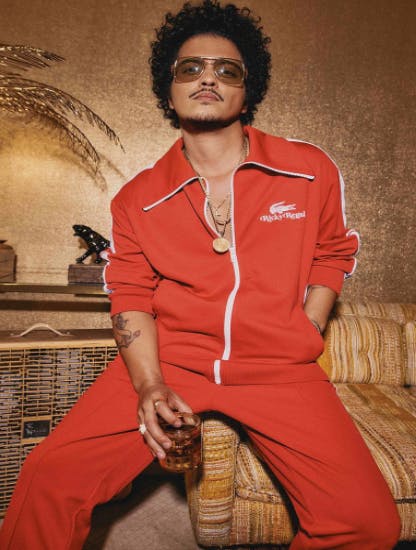At the 63rd presentation of the Grammys, Silk Sonic - a newly founded, neo-soul, R&B funk group composed of Bruno Mars and Anderson .Paak - lit up the stage with their debut performance of “Leave the Door Open”. A smooth, sensual take on 1970s Funk, “Leave the Door Open” captures the essence of black love in an expressingly braggadocious, yet thoughtful fashion. The harmonies are reminiscent of the Isley Brothers - low, soft background vocals floating atop simple drum progressions matched with tenderly soaked tenor vocals. More than paying homage to Black music during the 1970s, “Leave the Door Open” paves the way for artists searching for ways to incorporate Motown and Funk into their discography. Silk Sonic’s Sankofarration ( “It is not taboo to go back and fetch what you forgot.”) of 1970s music and style is not - unfortunately - unique. Modern trends have been moving backwards - best said by Virgl Abloh, “I think that like we’re gonna hit this like, really awesome state of expressing your knowledge and personal style with vintage – there are so many clothes that are cool that are in vintage shops and it’s just about wearing them.” Digging deep into the closet, Bruno and Anderson have found exactly what they’ve been looking for: a sound and style situated in the 1970s yet unquestionably modern and absolutely themselves. With “Leave the Door Open”, Silk Sonic has begun its contribution to this “vintage” trend. With the release of Silk Sonic’s debut album just over the horizon, one can only wonder: can this get any better?

In response to the release of “Leave the Door Open”, many critics (musical, historical, and social) have suggested that Bruno Mars - being that he is Hawaiin, not Black - is contributing to the epidemic that is cultural appropriation. When asked about the issue On The Breakfast Club with Charlamagne Tha God, Bruno says, “I would say: You can’t look at an interview, you can’t find an interview where I’m not talking about the entertainers that’ve come before me. And the only reason why I’m here is because of James Brown, is because of Prince, Michael [Jackson]—that’s the only reason why I’m here. I’m growing up as a kid, watching Bobby Brown [and] saying, ‘OK, if that’s what it takes to make it, then I’ve got to learn how to do the running man, I’ve got to learn how to do the moonwalk.’ That’s it. And this music comes from love, and if you can’t hear that, then I don’t know what to tell you.” What people tend to misunderstand about cultural appropriation is intent: if you intend to steal from another culture without educating yourself, exploit what you’ve stolen, popularize what you’ve stolen, or mock what you’ve stolen, you are appropriating another's culture. Respect, love, knowledge, and care for another’s culture isn’t appropriation insofar as it may benefit the benefactor. Bruno’s genuine love of Motown and the revolutionary music made during that era, his expansive knowledge of that music, and his open communication about his inspirations is - I dare say - by no means cultural appropriation. The phrase is thrown around so haphazardly it becomes difficult to accuse the true perpetrators of appropriation. Bruno’s inspirations - like the Isley Brothers - have contributed to the max exodus of black music from Blues and Soul to R&B, Neo-soul, Hip-Hop, Rap, Pop, and so on. Non-black artists such as Bobby Caldwell, Jacob Collier, John Mayer, Yebba, and more have drawn inspiration from Motown artists and they constantly wear their inspirations on their sleeves, making certain to pay homage to the progenitors of this movement. As the vintage trend gains popularity, we must be careful not to hark “cultural appropriation” everytime we see a non-Black person doing some black shit. We need to have more open and honest discourse about cultural appropriation, for the defamation Bruno Mars has received is unwarranted. What Bruno and Anderson have created is a fresh, modern take on 1970s Soul and R&B groups, a caricature that is readily forgotten but is ubiquitous in its inspiration (the Isley Brothers have been sampled over 900 times by both Black and non-Black artists so, again, I don’t want to hear no more Bruno Mars slander).



